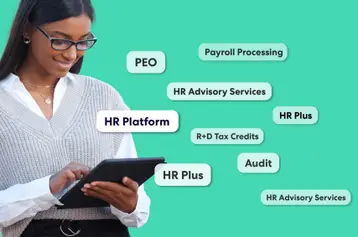How Do I Choose the Best HR Outsourcing Provider for My Business?

Table of contents
- 1.Understanding HR Outsourcing Options
- 2.PEO
- 3.HRO
- 4.ASO
- 5.Single-purpose providers
- 6.Key Criteria for Evaluating HR Outsourcing Providers
- 7.Service offerings
- 8.Cost structures
- 9.Compliance expertise
- 10.Scalability
- 11.Industry specialization
- 12.Global workforce capabilities
- 13.Decision-Maker's Checklist: Top Questions to Ask Potential Providers
- 14.Red Flags
- 15.The Evaluation Process
- 16.A Big Decision
More businesses are discovering the advantages and potential time savings of working with a human resources outsourcing provider. The global HR outsourcing market is expected to grow more than 8% per year, reaching an estimated $65.9 billion by 2035.
With such a vast marketplace for HR outsourcing providers, it can be challenging for a small or medium-sized company to choose the right provider. To narrow down the field, you’ll need to make a series of sound decisions. This guide will provide insights to help you by outlining the key selection criteria to keep in mind when looking for the best HR outsourcing provider for your company.
When you make the choice, you’ll get the services you need at a price that fits your budget. A provider who is a good fit for your business and delivers premium services can be a long-term asset that helps you thrive. You may enjoy an engaged and productive workforce, uninterrupted assistance in maintaining efficient business operations and the peace of mind that comes from knowing that experts are supporting compliance and risk mitigation.
Understanding HR Outsourcing Options
The first thing to consider is how many of your HR tasks you want to outsource – majority of them or only some? You’ll have a choice of full-service versus à la carte service offerings. Also, do you want outsourcing solutions tailored to your industry, or will general HR outsourcing solutions suffice?
There are different types of HR outsourcing models, each of which aligns with different business needs. These include:
PEO
A professional employer organization (PEO) and the client company is in a co-employment relationship where duties and responsibilities are allocated pursuant a client service agreement. A PEO helps handle a broad range of HR functions, making it a good choice for companies that want to outsource most of their HR responsibilities. A PEO also can provide its clients with access to health insurance and other employee benefits that are normally available only to large companies. This can be ideal for small and medium-sized companies that want to provide big-company benefit packages to attract and retain top employees.
HRO
A human resources outsourcing (HRO) provider offers specific support for HR functions, such as payroll services and processing, benefits administration, employee recruitment and talent acquisition tools, and/or compliance support. An HRO generally offers a solution with options, so you can choose which functions you want to outsource. It’s a good option for companies that want to outsource specific functions or streamline specific processes, rather than outsource most of their HR tasks.
ASO
An administrative services organization (ASO) may provide even more flexibility than an HRO. It’s a good choice for companies that want more control over which services they outsource. Working with an ASO also may give more options in customization. The range of services that ASOs offer, however, may not be as broad as those provided by an HRO or a PEO.
Single-purpose providers
If your company needs outsourced support in only one HR function, such as payroll services, you might be best served by a single-purpose provider.
Key Criteria for Evaluating HR Outsourcing Providers
Let’s review the services a small or medium-sized business might look for in an HR outsourcing provider.
Service offerings
The core HR functions that are typically outsourced can include:
- Payroll processing, including calculating pay, making deductions, issuing paychecks or direct deposits, keeping required payroll records, and, in some cases, filing and remitting employment taxes
- Administering employee benefits
- Maintaining and updating employee records
- Compliance support and risk mitigation
- Staffing solutions, which may include recruitment, onboarding, and training tools
- Providing, updating, troubleshooting, and maintaining the HR technology system
In addition to the core HR functions, other things to consider when you are evaluating potential outsourcing providers include:
- Whether your company needs specialized services and whether the potential provider offers them.
- Whether the provider’s HR technology platform meets your company’s needs. Will it integrate with your existing software?
- Do you want a self-service provider, a high-touch model, or something in between?
Cost structures
Different providers have different pricing models. The most common ones are:
- Per-employee. Costs are directly proportional to the number of employees in your company.
- Percentage of payroll. Costs may be higher for industries where employers have high salaries.
- Fixed fee. Costs may be more predictable.
There are fees to watch out for in each of those models. These may include:
- Implementation fees. These are one-time charges for setting up the system, which may involve training and data migration.
- Early termination fees.
- Charges for support outside regular hours.
- Software subscription fees.
- Fees for extra services, such as operations review, specific consultation, one-time needs for services beyond your contracted level, and travel expenses.
Keep in mind that the true cost of HR outsourcing includes not only the direct costs, but also any savings you might enjoy because of the added efficiency. Always consider the ROI when evaluating costs.
Compliance expertise
HR outsourcers provide compliance expertise that small and medium-sized companies may not have in-house. When evaluating providers, check that prospective outsourcers have:
- Regulatory knowledge and experience. These should cover employment-related rules and requirements at the federal, state, and local levels for where you have employees.
- Industry-specific compliance considerations. Some industries have their own set of requirements.
- Risk mitigation capabilities. What steps does the provider take to help mitigate risk?
- Compliance reporting and documentation processes. Does the provider remind you of important compliance deadlines? How are required documentation and filings handled?
- Wage and hour compliance. The provider should be able to support you with tracking and calculating overtime pay and paid and unpaid time off, according to the applicable policies and or compliance requirements.
Scalability
Over time, your HR service needs are likely to change. Often, companies need increased HR services because of business growth. Sometimes, companies need to decrease HR services. For example, seasonal businesses may have fewer employees at certain times of the year. To assess whether your HR outsourcing provider candidate can provide scalability, check for and ask about:
- Ability to grow with your business. Can the provider keep up with your increased needs?
- Flexibility to adjust service levels. If you have a planned or unplanned reduction in staff, can the provider make adjustments?
- Contract terms and commitment periods. Are you comfortable with these? Is the provider open to negotiation?[MN1]
- Support for geographic expansion. If you are planning to expand into other states and/or other countries, does the provider have the support or solutions to help?
Industry specialization
Depending on your business, industry-specific knowledge could be a deciding factor. Look for:
- How vertical expertise impacts HR service delivery
- Industry benchmarking capabilities
- Relevant case studies or success stories
Global workforce capabilities
Depending on whether you have employees in other countries, this could be a non-factor or vitally important. HR outsourcing companies that work with global workforce providers in the regions where you are hiring can provide essential assistance and guidance with:
- Complying with employment-related rules and requirements in the relevant countries
- Recruiting, hiring, onboarding, and paying foreign workers
- Offering access to big-company benefits required to assemble the optimal workforce.
Decision-Maker's Checklist: Top Questions to Ask Potential Providers
Based on the criteria we just covered, here are some key questions to put to HR outsourcing candidates.
- What is your experience working with businesses of our size in our industry?
- How do you handle compliance updates and help our business navigate compliance?
- What technology platforms do you use, and will they integrate with our existing systems?
- What is your client retention rate? Can you provide references from businesses like ours?
- What is your process for escalating and resolving service issues?
- What is your complete fee structure, including any potential additional charges?
- How will you scale services as our business grows or changes?
Red Flags
Before making a decision, see if you can identify any red flags, such as:
- Signs of provider instability or frequent turnover
- A lack of clear communication processes
- Limited technology capabilities
- Poor customer reviews or references
- Unclear pricing or value proposition
When you check references and talk to current or former customers of the HR provider, ask about these issues.
The Evaluation Process
Let's look at the basic steps a business typically takes as it chooses a provider.
- Create an internal needs assessment
- Research
- Build a provider shortlist
- Conduct thorough provider interviews
- Watch a demo
- Identify key performance indicators for measuring success
A Big Decision
Finding the right HR outsourcing provider has important strategic value for your business. It’s crucial that you find one that’s a great fit for your current needs and can grow with you in the future.
TriNet offers a full range of options for HR outsourcing, including:
- Administrative services organization (ASO) if you want options in choosing which service level you’ll receive.
- Professional employer organization (PEO) if you want a full-service co-employment arrangement that will help handle most of your HR needs and provide access to big-company benefits for your employees.
Contact us today to schedule a free, personalized consultation on your HR outsourcing needs. At TriNet’s HR Navigator, our expert HR consultants can help you create, based on your answers:
- A detailed review of your business and HR needs
- A professional, specific needs recap
- A plan for enhancing your business
Find out why HR outsourcing is becoming so popular with companies like yours.

TriNet Team
Table of contents
- 1.Understanding HR Outsourcing Options
- 2.PEO
- 3.HRO
- 4.ASO
- 5.Single-purpose providers
- 6.Key Criteria for Evaluating HR Outsourcing Providers
- 7.Service offerings
- 8.Cost structures
- 9.Compliance expertise
- 10.Scalability
- 11.Industry specialization
- 12.Global workforce capabilities
- 13.Decision-Maker's Checklist: Top Questions to Ask Potential Providers
- 14.Red Flags
- 15.The Evaluation Process
- 16.A Big Decision






